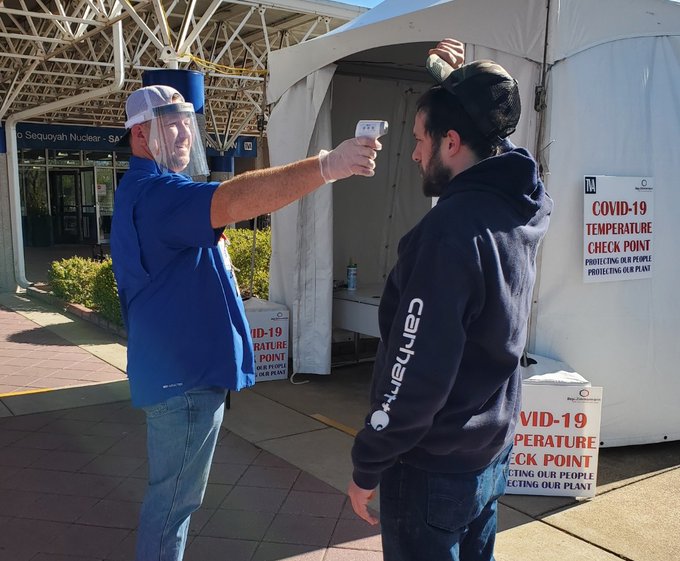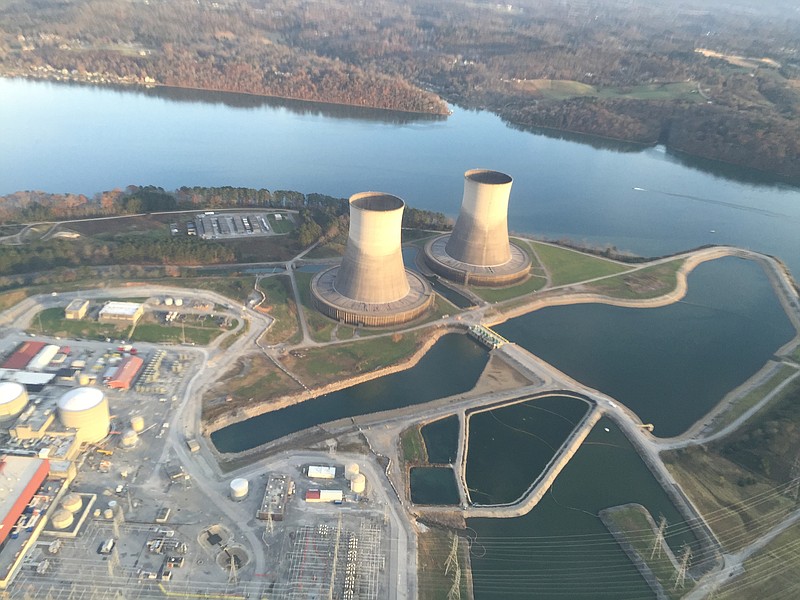After a two-week delay and cutbacks in the scope of maintenance to be done, workers at the Sequoyah Nuclear Power Plant began a refueling outage this weekend under new safety procedures adopted to limit to spread of any coronavirus.
The Tennessee Valley Authority shut down its newest reactor at Sequoyah on Saturday and will employ 1,600 workers over the next several weeks to refuel the Unit 2 reactor at the plant near Soddy-Daisy. But the refueling and maintenance work will use nearly 200 fewer workers than originally planned and defer some work until the next refueling outage in another 18 months due to the COVID-19 crisis.
"During this two-week delay, we have gone back and totally scrubbed the outage plan to look for every opportunity to delay any non-critical work that would have required having any non-critical people on site," TVA spokesman Jim Hopson said. "We've deferred what work we can."
Similar plans are being made for a May refueling outage at the Watts Bar Nuclear Plant, where a worker has tested positive for the COVID-19 virus.
"Because this individual followed TVA policy, promptly reporting early symptoms and immediately self-isolating, any exposure to other employees was minimized," Hopson said.
TVA crews have increased routine cleaning of equipment at all of the agency's nuclear power plants due to the virus, and the federal utility has limited access to critical areas of the reactors. All non-safety-oriented meetings have been canceled.
TVA also has plans in place for supplemental crews to provide even higher levels of cleaning and sanitation in any areas of the plant where anyone who tests positive for COVID-19 may have performed work.
"At Sequoyah, we have a total of three screening tents set up along sidewalk areas outside of the plant," TVA spokeswoman Malinda Hunter said. "All three tents are health screening checkpoints that all personnel [contract and employee] heading into the secure plant area must go to and pass their health screening before entering the plant."
TVA has painted lines every six feet approaching the tents, some stenciled with "social distancing" or "maintain six-foot separation."
 Contributed photo by the Tennessee Valley Authority / Kris Byrd scans the forehead of Traig Harper to take his temperature at one of the three medical screening tents TVA has set up outside of its Sequoyah Nuclear Plant near Soddy-Daisy. TVA is screening all workers going into Sequoyah, which is undergoing a refueling outage at the Unit 2 reactors
Contributed photo by the Tennessee Valley Authority / Kris Byrd scans the forehead of Traig Harper to take his temperature at one of the three medical screening tents TVA has set up outside of its Sequoyah Nuclear Plant near Soddy-Daisy. TVA is screening all workers going into Sequoyah, which is undergoing a refueling outage at the Unit 2 reactors"We have staggered shift starts, and have not been experiencing any wait lines," Hunter said.
Sequoyah is one of at least nine U.S. nuclear plants being refueled this month amid the COVID-19 crisis. TVA completed a refueling of the newest reactor at Browns Ferry on March 26 after that unit ran for 658 days.
Although TVA is not asking for any regulatory relief during its refueling outages when many maintenance changes and inspections are done, other utilities have at their plants.
Some environmental watchdog groups have questioned refueling projects where work hour rules and safety-related tasks are being relaxed. Paul Gunter, director of reactor oversight at the anti-nuclear group Beyond Nuclear, said with residents around nuclear plants ordered to stay home, normal evacuation procedures in the event of a nuclear plant accident are compromised during the global pandemic "and this is no time to be relaxing safety rules."
"They are using CDC COVID-19 guidelines to defer scheduled and required inspections and maintenance of critical safety components until the next refueling cycle eighteen months away," he said. "The regulator and the industry know full well that they are rolling in a COVID-19 Trojan Horse with these refueling crews traveling from one reactor site and community to the next."
Gunter said workers at plants that are refueling, such as the Limerick nuclear plant in Pennsylvania, have publicly expressed alarm at the overcrowded conditions, describing workers sitting "elbow to elbow" in canteens and computer labs, and saying they are "terrified" that this will lead to widespread infections of the coronavirus.
Gunter suggested that plants not be restarted after a refueling outage until inspections and regulatory reviews are completed.
Hopson said nuclear power is the cheapest, carbon-free source of power for TVA and accounts for more than 40% of the electricity that TVA generates to power the utility's 7-state region.
Contact Dave Flessner at dflessner@timesfreepress.com or 423-757-6340.
